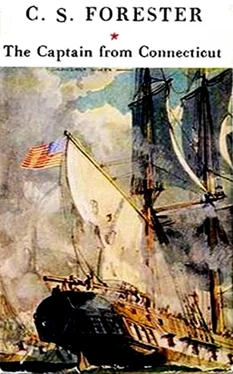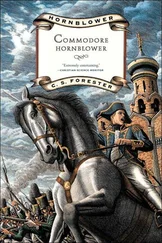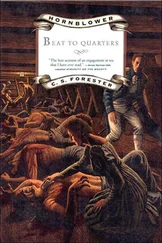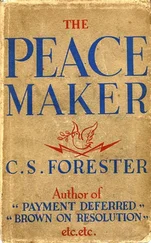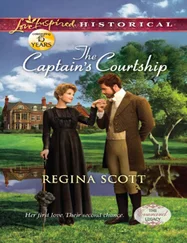“A message from Mr. Hubbard, sir,” he panted. “Cutter in sight, and bearing up for us.”
“My compliments to Mr. Hubbard, and I’ll come on deck.”
Peabody turned to his guests.
“I beg your pardon, gentlemen. I hope you will excuse me for a moment.”
They rose in reply—it was a continual mild surprise to Peabody that the conventional manners which he found it so hard to employ always worked so well.
Peabody ran up on deck; Hubbard was looking through his glass at the jaunty cutter which was running towards them—a typical island boat with patched brown sails.
“Heave to, Mr. Hubbard, if you please.”
The cutter was bowling along briskly under a light air which had hardly been moving the Delaware, but then the latter had had no more than topsails set. The cutter, as Peabody saw through the glass, had a coloured hand in the bows and two more in the waist; aft, at the tiller, there sat a man in dazzling white clothes. He put up his tiller, and the cutter came neatly into the wind and took in her head sail; a moment later, the dinghy, which had been towing astern, came sculling briskly across the glittering water with the white-clad man in the stern sheets, and a half-naked negro at the sculls. Peabody met the visitor as he came dexterously up the side.
“Mr. Hunningford?”
“Captain Hunningford, sir. And I have the honour to address——?”
“Josiah Peabody.”
“Of the United States frigate Delaware,” supplemented Hunningford, looking round the ship with a keen professional eye.
“I have been beating about waiting for you for the last week,” said Peabody irritably.
“And I, sir,” said Hunningford, with sublime insouciance, “have been waiting for you for two months.”
He was a man as tall as Peabody, and even thinner, and without Peabody’s heavy shoulders. He had a lean, mobile face and a twinkle in his eye—it was the face of a young man in strange contrast with his snow-white hair.
“What news have you for me?” demanded Peabody.
Hunningford looked round the deck.
“I would prefer,” he said gently, “to tell you that in conditions a little more private.”
“Come below,” said Peabody curtly.
He led the visitor down the companionway, pausing outside the door of the main cabin he heard Styles’ voice lifted in song, and directly afterwards the rest of the company joined in the chorus.
“This way,” said Peabody, opening the door of the sleeping cabin.
Hunningford sat down on the locker and left the cot to Peabody.
“You are comfortable enough here,” he said, glancing about him. “But I would prefer to have that skylight closed.”
Peabody followed his gaze, and reopened the door to give the order to the sentry outside. Then they waited in silence until the skylight closed over their heads.
“Well?” said Peabody.
“The Jamaica convoy sails in nine days’ time,” said Hunningford. “The escort will be the Calypso, 36, corvette Racer, 20, if she’s back in time, which I expect, and the brig Bulldog, 14. They will sail by the Windward Passage, and will rendezvous with the Leeward Islands convoy in Latitude 25 North, Longitude 65 West.”
This was precise enough information, if it were correct.
“How do you know this?” asked Peabody.
Hunningford shrugged his shoulders.
“I am paid no commission for revealing that,” he said. “But if you imagine that a convoy of a hundred sail can be assembled without certain facts leaking out you have a higher opinion of human nature than I have. My commercial connections give me certain opportunities and privileges.”
Peabody felt a certain surly hostility towards this elegant spy, partly because of his elaborate manner, and partly because of the way he lived, associating with honest merchants, and selling them to their enemies.
“Are you sure of what you say?” he asked.
“My dear sir,” said Hunningford, crossing his knees, “you are treating me with a suspicion which is quite unwarranted. If I wished to betray you, you can be quite sure that it would not be my cutter which kept our appointment, but a squadron of British frigates.”
That was perfectly true, and it ought to have lessened Peabody’s instinctive dislike for the man, but it did not. But he did not allow his dislike to interfere with his questioning.
“What news of the privateers?” he asked.
“Ah!” replied Hunningford archly. “Now we approach the crux of the matter. I am in touch with the schooners Emulation, Captain Daniel Gooding, and Oliver, Captain James Curtis, both out of Baltimore. I have already passed on to them some valuable pieces of information, but the Jamaica convoy is rather more important, as both you and they agree. They are anxious to receive instructions from you. With your assistance, Captain, they hope to make themselves both wealthy for life. To me, it is more important that my commission on their captures will make me wealthier still.”
“I’ll give you a letter to them.”
Hunningford put his fingers to his lean throat, and made a realistic choking noise.
“You must dislike me very much, Captain, if you are so anxious to see me cut off in my respected old age. I will carry any verbal message you like, but nothing in writing.”
Peabody looked his puzzlement, and Hunningford condescended to further explanation.
“I come and I go,” he said. “My manifold business interests take me from island to island. As far as I know, no suspicion attaches to me. No one, save my negroes, knows that to-day I encounter you just out of sight of land, and to-morrow Captain Gooding. I could be arrested and examined at any moment, and I should welcome this examination, which could only clear my fair name. But if I carried a letter from a United States captain——”
He repeated his former gesture, putting his head on one side, and rolling up his eyes with hideous added realism.
“What do you want done, then?”
“You must tell me your plans, Captain, and I’ll pass them on.”
Peabody rubbed his chin, and stared at Hunningford; the latter’s malicious grey eyes met his own hard blue ones without flinching.
“What’s the force of these two schooners?” he demanded.
“They’re both big enough to take care of themselves. The Emulation’s two hundred and fifty tons, the Oliver’s over two hundred. Oliver has four long nine and ten twelve-pounder carronades. Emulation threw half her guns overboard last December, when the Fox chased her in a calm, but she’s rearmed herself from prizes—sixes, nines, and a couple of twelves.”
Peabody’s mind began to analyse the tactical problem presented.
“Neither Gooding nor Curtis,” said Hunningford, “will fight a king’s ship if they can help it.”
Peabody knew that; no privateer captain who knew his trade would risk his ship and face certain crippling damage in action with a man o’ war. If he were to lock yardarms with the Calypso there was still the rest of the escort to consider—the Bulldog alone could probably beat off the privateers, and the Racer, if she were present, could outfight them both. But the disparity of force was not so great as to be insuperable; the West Indian convoy was a prize, indeed, and any serious loss to it would raise a storm among the merchants of London. It was most unlikely that, for some time to come, there would be any equally attractive objective for an attack at smaller risk.
“Tell them,” said Peabody, “to meet me behind Tortuga on the second of next month.”
Hunningford nodded.
“They wouldn’t come,” he said, “unless I told them that there was a capable captain in command. I’ll tell them that, too.”
Peabody shot a surprised glance at him, but Hunningford reverted instantly to his former tone of light cynicism as he rose to his feet.
Читать дальше
